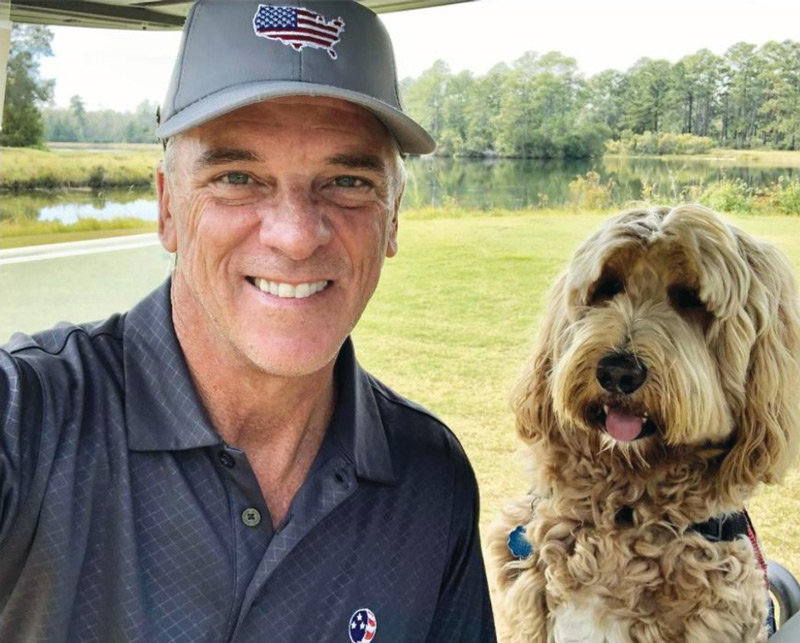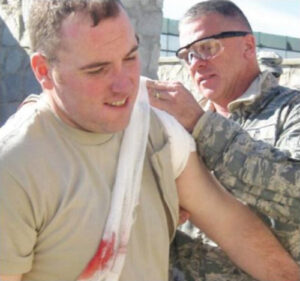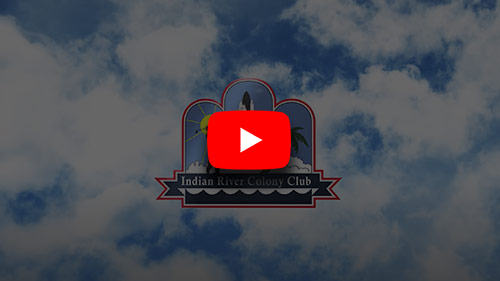IRCC Resident Relies on Golf for Long-Term Healing from War
BY MARIA SONNENBERG | Senior Life Newspaper – Feb 14, 2023
Golf can be vexing and exhilarating. For wounded warrior Ken Gestring, it is also healing.
The camaraderie and challenges of the game have helped the retired Air Force master sergeant heal from the serious physical and psychological injuries he endured while deployed to Afghanistan.
Given a family with a father, four uncles and two brothers in the Air Force or Navy, Gestring knew he would join the military. He signed up in 1986, just before turning 21 in the idyllic-sounding town of Niceville in northwest Florida.
“It was indeed a very nice place to grow up in,” Gestring said.
The stories his middle brother related about his work as a medic at Eglin Air Force sealed the deal.
“I decided it sounded like a cool job,” he said.
His military career included coordinating medical evacuations in the Pacific and, in 2009, deployment to Afghanistan, where he served as senior team medic to provincial reconstruction teams tasked with checking on road and building projects funded by the U.S. government.
“I had been 23 years in the service when I got deployed,” Gestring said.
His luck had held for almost a quarter of a century, but the streak would soon end in Jalalabad, Afghanistan.
While walking on a mission to locate a project, as a small group of Afghani onlookers watched, Gestring’s team was ambushed by an anti-Afghan forces sub-munitions attack.
“Shrapnel went everywhere,” Gestring said.
He knew he had been hit, but his duty trumped the pain and Gestring went to work.
“He provided care under fire without regard to his own personal safety and injuries he sustained from the blast,” noted Brig. Gen. Dr. Kory Cornum, the 81st Medical Group commander, during a 2010 ceremony honoring Gestring at Keesler Air Force Base.
Gestring treated nine injured coalition forces and three Afghan National Police.
“His immediate response and swift tactical treatment during this mass casualty event saved their lives by preventing their injuries from becoming life-threatening,” Cornum added.
Unfortunately, there were some he could not save. Four Afghan children, part of the group of onlookers, perished.
“The kids were very hard for me to cope with, particularly since they were about the same age as my own children,” Gestring said.
It was only after the team arrived at a medical facility that Gestring discovered the extent of his own injuries. Shrapnel damaged three vertebrae, his rotator cuff, wrist, lower back and leg. He also suffered a traumatic brain injury and PTSD. Gestring removed some of the shrapnel himself and returned to work immediately. He retired in 2011.
He calls his wife, Corina, his “caregiver and his calendar,” since the brain injury makes him forgetful. The couple moved to the Indian River Colony Club last year in part because of the golf.
“Golf has been a huge therapy,” he said.
Not only does it keep his body moving, but the game has connected him with other heroes through competition in the Wounded Warriors Games.
“We communicate a lot through golfing events,” he said.
A sponsor of a special tournament hosted by former President George W. Bush has provided Gestring with a lifetime membership to golf courses across the nation. When he plays, Gestring usually brings along his service Labradoodle, Melo, now a celebrity featured on the Golf Channel.
He knows his injuries will never fully heal, but with the help of the friends he has made through golf and the physical challenges of the game provides him, Gestring is ready for the future.
“Recovery is lifelong,” he said. To watch the George W. Bush Institute interview of Gestring, visit youtu.be/8xnB9QC0tW8.

Copyright © 2018 - 2024 Indian River Colony Club | Designed by Green Man Creations
Disclaimer: The appearance of U.S. Department of Defense (DoD) visual information does not imply or constitute DoD endorsement.
This website uses cookies
Privacy Overview
| Cookie | Duration | Description |
|---|---|---|
| _GRECAPTCHA | 5 months 27 days | This cookie is set by the Google recaptcha service to identify bots to protect the website against malicious spam attacks. |
| cookielawinfo-checkbox-advertisement | 1 year | Set by the GDPR Cookie Consent plugin, this cookie is used to record the user consent for the cookies in the "Advertisement" category . |
| cookielawinfo-checkbox-analytics | 11 months | This cookie is set by GDPR Cookie Consent plugin. The cookie is used to store the user consent for the cookies in the category "Analytics". |
| cookielawinfo-checkbox-functional | 11 months | The cookie is set by GDPR cookie consent to record the user consent for the cookies in the category "Functional". |
| cookielawinfo-checkbox-necessary | 11 months | This cookie is set by GDPR Cookie Consent plugin. The cookies is used to store the user consent for the cookies in the category "Necessary". |
| cookielawinfo-checkbox-others | 11 months | This cookie is set by GDPR Cookie Consent plugin. The cookie is used to store the user consent for the cookies in the category "Other. |
| cookielawinfo-checkbox-performance | 11 months | This cookie is set by GDPR Cookie Consent plugin. The cookie is used to store the user consent for the cookies in the category "Performance". |
| CookieLawInfoConsent | 1 year | Records the default button state of the corresponding category & the status of CCPA. It works only in coordination with the primary cookie. |
| viewed_cookie_policy | 11 months | The cookie is set by the GDPR Cookie Consent plugin and is used to store whether or not user has consented to the use of cookies. It does not store any personal data. |
| Cookie | Duration | Description |
|---|---|---|
| __cf_bm | 30 minutes | This cookie, set by Cloudflare, is used to support Cloudflare Bot Management. |
| Cookie | Duration | Description |
|---|---|---|
| _ga | 2 years | The _ga cookie, installed by Google Analytics, calculates visitor, session and campaign data and also keeps track of site usage for the site's analytics report. The cookie stores information anonymously and assigns a randomly generated number to recognize unique visitors. |
| _ga_7VX52F0C6J | 2 years | This cookie is installed by Google Analytics. |
| _gat_gtag_UA_6914591_1 | 1 minute | Set by Google to distinguish users. |
| _gcl_au | 3 months | Provided by Google Tag Manager to experiment advertisement efficiency of websites using their services. |
| _gid | 1 day | Installed by Google Analytics, _gid cookie stores information on how visitors use a website, while also creating an analytics report of the website's performance. Some of the data that are collected include the number of visitors, their source, and the pages they visit anonymously. |
| CONSENT | 2 years | YouTube sets this cookie via embedded youtube-videos and registers anonymous statistical data. |
| Cookie | Duration | Description |
|---|---|---|
| _fbp | 3 months | This cookie is set by Facebook to display advertisements when either on Facebook or on a digital platform powered by Facebook advertising, after visiting the website. |
| fr | 3 months | Facebook sets this cookie to show relevant advertisements to users by tracking user behaviour across the web, on sites that have Facebook pixel or Facebook social plugin. |
| VISITOR_INFO1_LIVE | 5 months 27 days | A cookie set by YouTube to measure bandwidth that determines whether the user gets the new or old player interface. |
| YSC | session | YSC cookie is set by Youtube and is used to track the views of embedded videos on Youtube pages. |
| yt-remote-connected-devices | never | YouTube sets this cookie to store the video preferences of the user using embedded YouTube video. |
| yt-remote-device-id | never | YouTube sets this cookie to store the video preferences of the user using embedded YouTube video. |
| yt.innertube::nextId | never | This cookie, set by YouTube, registers a unique ID to store data on what videos from YouTube the user has seen. |
| yt.innertube::requests | never | This cookie, set by YouTube, registers a unique ID to store data on what videos from YouTube the user has seen. |
| Cookie | Duration | Description |
|---|---|---|
| b_fgNz- | 1 day | No description |
| OmdalzGo | 1 day | No description |
| wcgoR_rHEJPO | 1 day | No description |
| YOi_HJFkKhuVQsCz | 1 day | No description |



